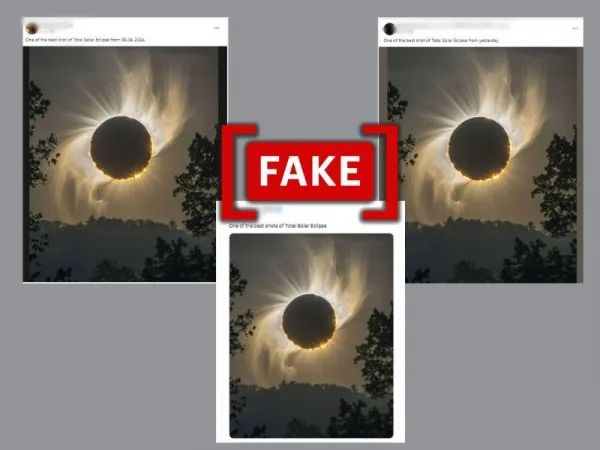By: Emmi Kivi
April 16 2024
 Source: X/Facebook
Source: X/Facebook
The image is AI-generated and does not show the total solar eclipse.
What is the claim?
On April 8, a total solar eclipse swept across North America, passing over Mexico, across the U.S. from Texas to Maine, and Canada’s Atlantic coast. Solar eclipses happen when the moon passes between the sun and Earth, wholly or partially blocking the sun’s face. In a total solar eclipse, the sun’s face is totally blocked, and the sky darkens, resembling dusk or dawn.
Soon after this celestial event, one photo of the total eclipse supposedly showing the eclipsed sun in the middle of forest trees circulated widely online. The photo shows the covered sun surrounded by yellowish swirls of light. The image was shared with captions of awe, “One of the best shot of Total Solar Eclipse from yesterday” and “One of the best shot of Total Solar Eclipse from 08-04-2024."
However, Logically Facts found that the image is fake.
What did we find?
“Based on seeing the eclipse and the solar corona with my own eyes on Monday, I can confirm that this very dramatic picture is not the same sun that we saw in Texas. While very beautiful and dramatic, this picture is definitely artificial,” Juha-Pekka Luntama, Head of the Space Weather Office at the European Space Agency (ESA), told Logically Facts after assessing the viral image.
The photo also provides clues to indicate the image is not real. For instance, the image lacks credit to the photographer or information about where it was taken. “Typically those posting such eclipse images report where and how they obtained it. The lack of such details raises a red flag for me,” Chirag Shah, Professor in Information School at the University of Washington told Logically Facts.
A reverse image search yielded no credible news media, research, or space agencies using the image when reporting on the April solar eclipse. After raising suspicion on the credibility of the accounts disseminating the image, Shah affirmed to Logically Facts, “Further analysis could be done with the image metadata and other contextual information, but at this point, I have enough confidence in this image being fake.”
During a total solar eclipse, the outermost part of the sun’s atmosphere, or “corona,” becomes visible, creating a ring of white light around the sun. Usually, it is obscured by the bright light of the sun. We compared NASA’s images of the total solar eclipse and the sun’s corona to the viral image, finding visual discrepancies.
Left: The viral image of the total solar eclipse and the sun's corona. Right: Photos credited to NASA of the 2024 total solar eclipse (top). The detailed image of the sun's corona (bottom) is from the 2017 total solar eclipse. (Source: X/NASA/Composite by Logically Facts)
The image also appears practically impossible; it shows both forest trees and the astronomically distant sun in sharp detail. The photographic focus would be on either a ground image of the eclipse from afar or showing the sun in detail, not both. This is the case in authentic photos of the solar eclipse. No trees would be visible if the image were real and showed the sun in such detail. Also, when the total eclipse ended on the Atlantic Coast, the sun was still at a relatively high altitude over two hours before sunset in Newfoundland and Labrador in Canada, LeadStories noted.
While AI detection tools should not be relied on as the sole indicator of a photo’s authenticity, they can signal further clarification to detect if an image is real. We tested the image’s authenticity with the AI-generated Content Detection tool Hive Moderation. The inquiry led to the result that the image is 99.9 percent AI-generated.
Screenshot of the verdict of AI detection tool Hive Moderation showing the image is 99.9 percent likely to be AI-generated. (Source: Hive Moderation/Screenshot)
Logically Facts’ guide to detect AI-generated images provides more tips to determine if a photo is real or fake.
The verdict
No, the image does not show the total solar eclipse in April. Expert assessment, image comparisons, and practical considerations conclude the image is AI-generated. Therefore, we have marked the image as fake.